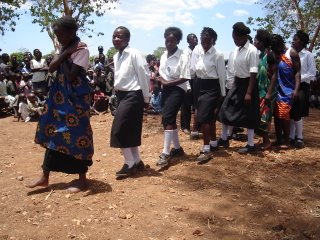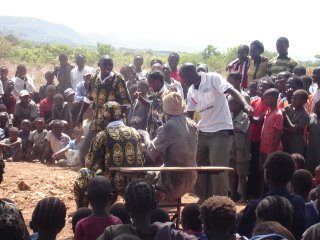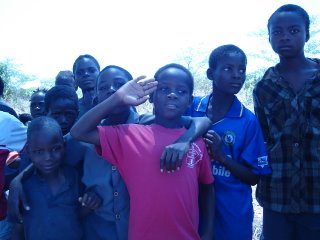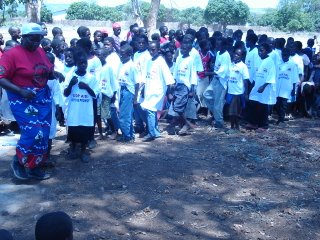World AIDS Day 2006




1st December 2006
World AIDS Day. This year we are holding the celebration in Chimusanya. I was meant to be on the organising committee but failed to attend all but one of the planning meetings. Fortunately, Bernadette is in control. She has secured funding and has had two hundred T-shirts of appalling quality printed up for the participants. They bear the slogan “We Can All Do More!” I complain that I am approaching my maximum capacity, but am ignored so I pull one on anyway.
The march is scheduled to begin at eight o’clock. At around eight thirty, we are still hanging around the hospital entrance while last minute negotiations regarding transport of the local youth group take place. Finally we leave, and we arrive at the school in Chimusanya just over an hour late. Nothing is happening yet. We walk down the road to where the march is due to start off, with two hundred schoolchildren following behind us. Then, we hang around a bit more for good measure.
Eventually the procession goes down the road, led off by members of the local support group who sing loudly as we go. We arrive back at the school and the programme begins with some pupils from Mulamba singing. Chas and I stand at the back until it becomes apparent that the empty seats at the front are intended for us. At first the schoolkids stand away from us, but as the morning wears on, they press up behind us to get a better view of the performances. I can cope with children leaning over my shoulders, but when I become aware of small, curious fingers raking through my hair, I decide to resume my standing position.
There are a number of drama and music groups performing through the day. Men dressing as women are a recurrent and much appreciated feature of the entertainment and one play includes a long and intricately choreographed fight sequence. But the best performance of the day is from a group of local schoolgirls who sing and read poems about HIV. One of them talks about how their school is suffering because many of their teachers have died or become sick. Another gets the biggest cheer of the day when she says “what we need is behaviour change”. It’s all just talk, of course. But hearing it said publicly and applauded makes you feel a little hopeful.
Meanwhile, word gets out that Bernadette is in possession on a quantity of T-shirts, and she is harassed relentlessly by a number of people who firmly believe that they are deserving recipients of such a garment. Somehow, she manages to stay calm, in the face of many spurious, but passionately voiced claims. Some people sidle up to Chas and me in the belief that we can influence the distribution process, but we have long since given ours away.
Later in the day, when we are back at the hospital, I am called to the hospice to see one of the HIV patients. He has been bleeding internally for the last few days, and yesterday we agreed with his family that we would stop giving him blood transfusions. Tonight he is having difficulty breathing. There is nothing left to do. I sit by the bed in the darkness with his mother, watching his chest rise and fall until it stops. He is one of the 250 Zambians who will have died of AIDS today. There is real cause for optimism, celebration even, but still people are coming forward for treatment too late.

0 Comments:
Post a Comment
<< Home